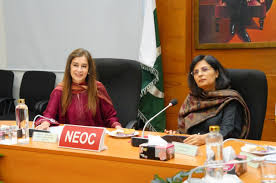In a critical step toward eliminating polio and improving routine immunization outcomes, Ayesha Raza Farooq, the Prime Minister’s Focal Person on Polio Eradication, chaired a high-level strategic meeting with Dr. Sania Nishtar, CEO of Gavi, the Vaccine Alliance, at the National Emergency Operations Centre (NEOC). The meeting marked a key milestone in reaffirming Pakistan’s commitment to achieving sustainable immunization goals through enhanced partnerships and integrated health services.
Unified Vision for Immunization: A National Commitment
During the session, Ayesha Raza Farooq lauded Gavi’s steadfast collaboration and highlighted the government’s intent to treat routine immunization as a national mission. She emphasized that Pakistan’s approach is no longer reactive but grounded in proactive, integrated planning that links polio eradication with routine childhood immunization services.
The focus was not just on vaccination but on ensuring holistic health access for underserved and high-risk populations. The government plans to extend its outreach beyond immunization to include nutrition, clean drinking water, sanitation infrastructure, and accessible clinics, creating a layered support system that can better protect vulnerable children.
Strategic Discussion Points: Toward Sustainable Immunization Systems
The meeting delved into several forward-looking themes, including:
- Harmonizing Polio and Routine Immunization Programs: Efforts are underway to streamline strategies so that both vertical programs operate in synergy, using the same infrastructure, outreach mechanisms, and data platforms.
- Strengthening Health Access in High-Risk Areas: The participants stressed the importance of geographically targeted interventions, particularly in regions with repeated virus detection, poor sanitation, and low immunization coverage.
- Data-Driven Policy Making: Advanced surveillance, mapping, and digital tracking tools are being prioritized to pinpoint vaccination gaps and monitor coverage in real time.
- Community Engagement & Trust Building: There was consensus that successful immunization cannot occur without earning the trust of the communities. Mobilization of local influencers, religious scholars, and women health workers will play a central role in fighting vaccine hesitancy.
- Coordinated Funding & Accountability: Participants highlighted the need for pooled funding mechanisms, performance-based incentives for local health units, and regular impact audits to ensure transparency and effectiveness.
Multi-Stakeholder Participation for a National Health Goal
The meeting was attended by a wide range of key national and international partners in public health. In addition to Dr. Sania Nishtar and Ayesha Raza Farooq, attendees included:
- Dr. Soofia Yunus from the Federal Directorate of Immunization (FDI)
- Muhammad Anwar-ul Haq, NEOC Coordinator
- Senior representatives from the Centers for Disease Control (CDC), Bill & Melinda Gates Foundation, World Health Organization (WHO), UNICEF, Expanded Programme on Immunization (EPI), and the Pakistan Polio Eradication Programme
Their collective input contributed to an emerging blueprint for synchronized vaccine delivery, drawing on global best practices and local community insights.
Looking Ahead: A National Immunization Reset
The meeting concluded with a shared commitment to:
- Launch a joint polio and routine immunization strategy with clear KPIs and timelines
- Mobilize national resources and international support for the upcoming immunization rounds
- Monitor progress via weekly health dashboards and quarterly review meetings
- Expand primary healthcare infrastructure in vulnerable districts to support long-term resilience against disease outbreaks
This collaboration between the Government of Pakistan and Gavi is not just about disease prevention it’s about building a sustainable, equitable, and responsive health system that delivers results for every child.
Pakistan’s polio and immunization drive is now entering a decisive phase one that requires unity, agility, and trust between communities, government institutions, and international partners. The seeds planted in this meeting could well shape the country’s healthcare future for generations to come.



Comments (0)
No comments yet. Be the first to comment!
Leave a Comment